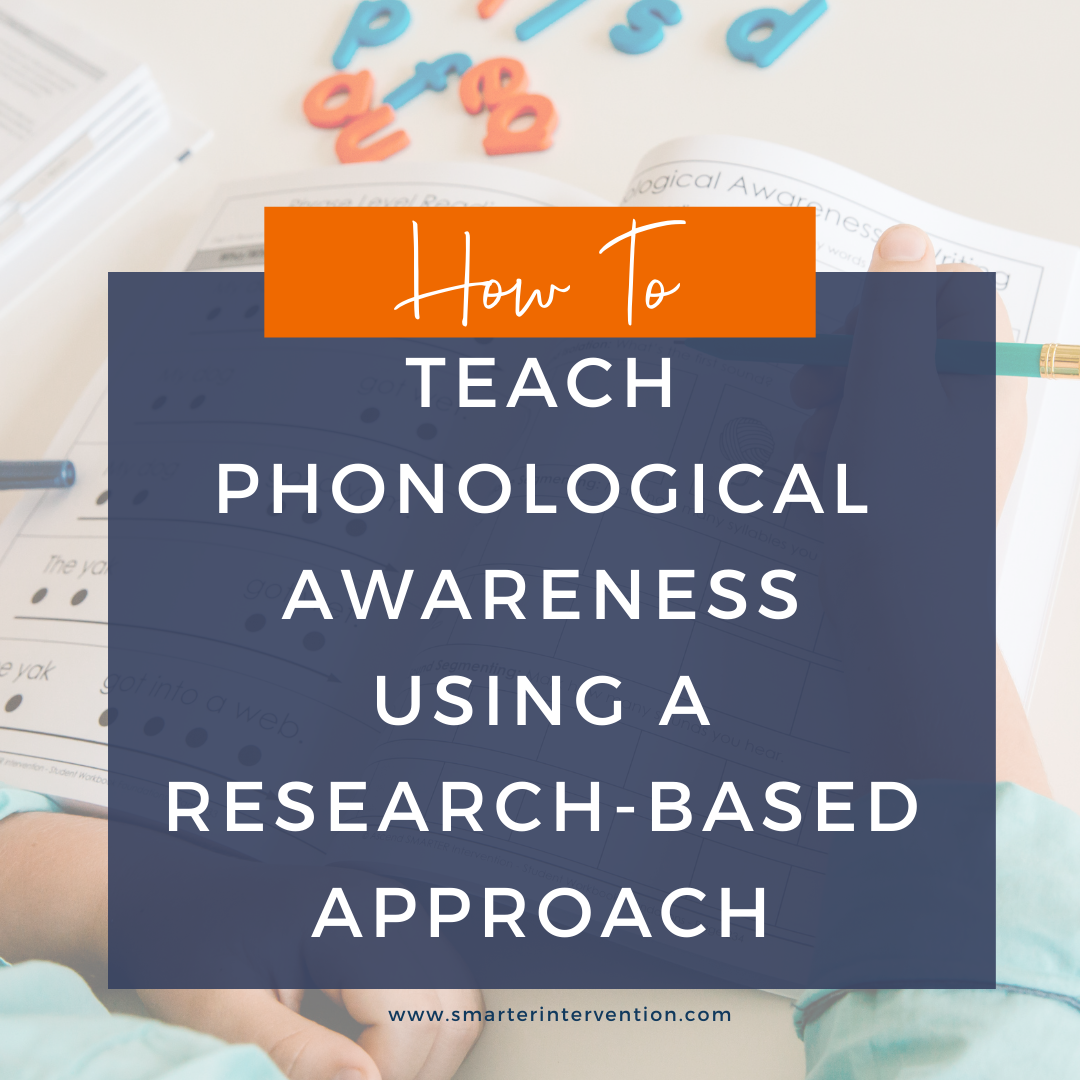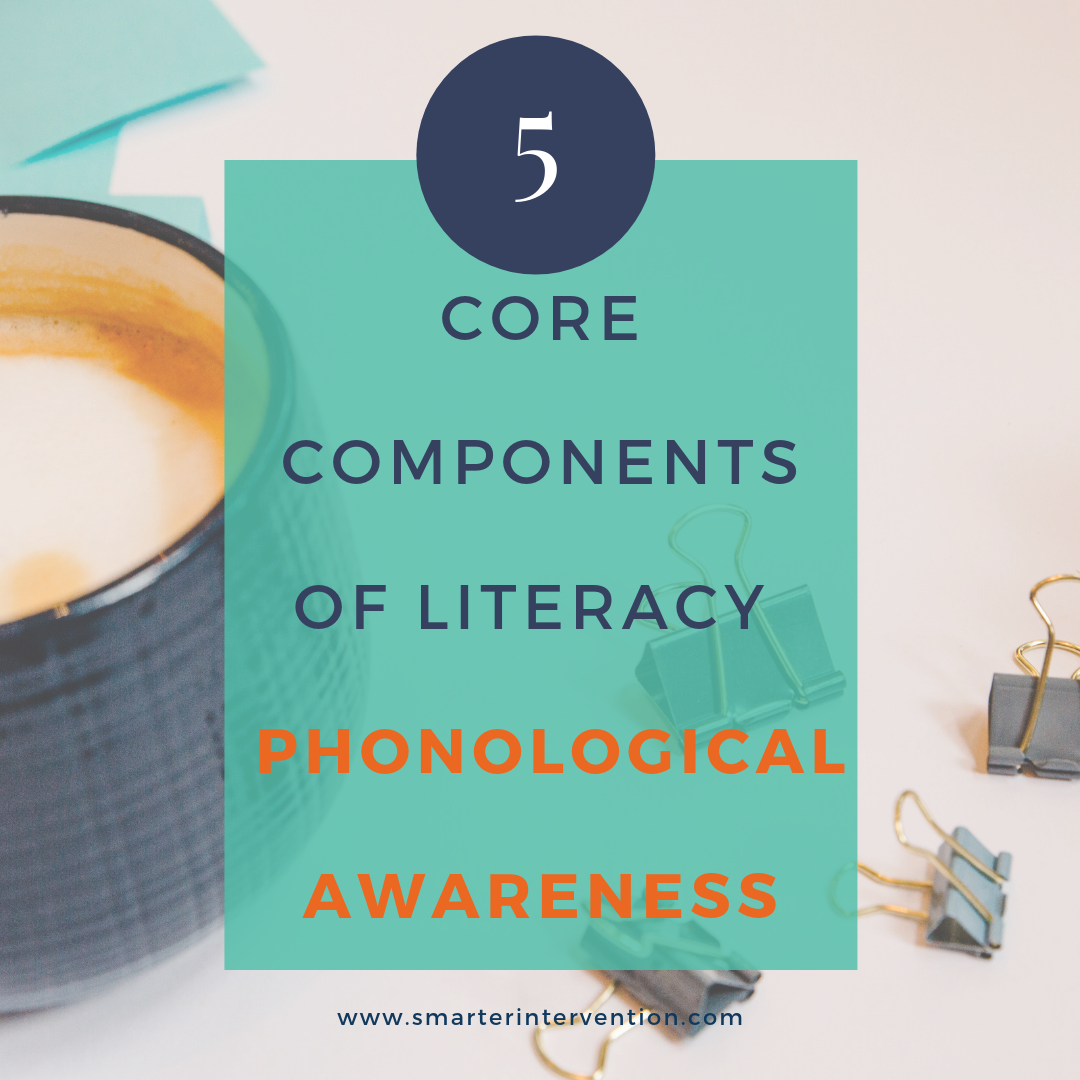Science-based literacy resources and articles
for families, educators and schools
Search by Category:
Categories
- Advocacy
- Business
- Comprehension
- Data Tracking
- Differentiation
- Dyslexia
- Evaluation and Assessment
- Executive Functioning
- Games & Activities
- Helping My Child At Home
- IEP/504 Plan
- Lesson Planning
- Math
- Online Intervention
- Organization
- Parents
- Phonics
- Phonological Awareness
- Reading Fluency
- Research
- SLP
- Spelling
- Vocabulary
- Writing
Do I Need to Teach Phonological Awareness Skills?
To teach, or not to teach phonological awareness…this is the question (especially because research seems to be ever-changing in this area)!!
Check out this blog for answers to understand its importance, target specific skills, and integrate PA seamlessly into your lessons. Explore why phonological awareness matters for all ages and how to make it feel cohesive.
Should I Teach Phoneme Segmenting?
Phoneme segmenting is essential to spelling success. In order to spell a word (especially an unfamiliar one!) we first need to identify what sounds we hear. Keep reading to learn more about the importance of phoneme segmenting and how you can incorporate this instruction into your lessons!
Should I Teach Syllable Segmenting?
Can you spell supercalifragilisticexpialidocious? Can your students?
In all seriousness, supercalifragilisticexpialidocious isn't the most functional word to spell – but as students progress academically, they do need to be able to break down long words for reading and spelling. Keep reading to learn why syllable segmenting is necessary and how to incorporate this instruction into your lessons!
Should I Teach Phoneme Isolation?
Phoneme isolation is a critical skill in both reading and spelling.
It helps us sequence the sounds we hear when we sound words out. It allows us to differentiate between things like stop and spot. It can help students recognize their errors in spelling, too.
Improve spelling accuracy with phoneme isolation! Learn why it's crucial for reading and spelling success. Discover practical strategies and activities to support sound isolation in our blog.
Should I Teach Auditory Discrimination?
Do your students ever mix up certain sounds? Maybe they mispronounce words, like calling milk "melk" or they spell "met" as "net."
Enhance your students' auditory discrimination skills for better pronunciation and spelling! Explore why this skill is crucial for reading and spelling accuracy. Get practical tips and resources to support auditory discrimination in this blog.
Should I Teach Sentence Segmenting?
Phonological awareness skills are often taught to support reading and spelling. But…did you know that some PA skills can directly support reading comprehension as well?
Discover how sentence segmenting enhances literacy skills beyond spelling and reading. Learn how to improve memory, comprehension, and writing structure.
Should I Teach Phoneme Manipulation?
Say this word without the first sound…
Say this word backward.
Change the last sound in this word…
Are phoneme manipulation skills really necessary?
In short, yes. Keep reading to learn more!
Should I Teach Phoneme Blending?
Raise your hand if you've ever told a student to "sound it out" when they were reading.
We imagine just about everyone's hand went up just then. And if this isn't something you've said to students, it's incredibly likely they've heard it from someone else.
But how exactly do we teach students to do this? Do we need to teach students to do this? Keep reading for answers to all of your phoneme blending questions!
Should I Teach Syllable Blending?
You might be wondering when it would be important to teach syllable blending. Is this a skill students even need?
The answer to that question is yes. This is a skill that students, in fact, need. But there are specific times when teaching this skill will be most important. Keep reading to learn more!
Should I Teach Rhyming?
You may be wondering if teaching students to rhyme is really necessary. Recently, research has been mixed on whether or not we should be targeting this skill in our instruction.
The argument here is that it isn't necessary to teach because it doesn't directly translate to reading in the same way blending does.
So…should we be teaching rhyming? Keep reading to find out.
How To Fit Phonological Awareness into Your Reading & Writing Lessons
It is no secret that phonological awareness skills are a key component to reading and spelling, but for a long time it felt like the way to effectively fit these drills into our lessons WAS a secret! After a while of looking at the data (and some trial/error!), we found a way that worked for us and want to share it with you!
How to Teach Phonological Awareness using a Research-Based Approach
First things first, what is phonological awareness?
We’re so glad you asked, at the simplest level - it’s understanding the sounds of our language. It includes skills that we need to break words up into individual sounds and blend sounds together in order to “sound words out.” Phonological awareness DOES NOT require any knowledge of letters. Students could complete phonological awareness drills completely in the dark (meaning they don’t need to be reading or recognizing letters at all). The number of sounds in words and letters in words are not always the same!
How to Teach Phonological Awareness Systematically
We always knew of the importance of phonological awareness in developing literacy skills and we knew that under-developed phonological awareness skills are a critical factor in students with reading struggles such as dyslexia and are a common issue for students with speech-language disorders.
If you know us at all, you know that we always frame everything from the literacy processing triangle lens.
How to Differentiate Phonological Awareness Instruction - Intervention Tip of the Week
Phonological awareness is one of those tasks that many feel is a skill that only primary teachers need to address.
However, for many students who struggle to read or spell with accuracy - a phonological processing issue is at the heart of it.
This means that we need to be explicitly teaching phonological awareness skills until they’re mastered. Now that being said - we need to be thoughtful and strategic in HOW we are doing this.
Check out this week’s intervention tip of the week to learn about how we differentiate for
How to Assess Phonological Awareness - Intervention Tip of the Week
This week we are talking all about how to effectively measure a student’s phonological awareness ability to track growth over time. It is important that we are monitoring a student’s phonological awareness because it is the foundation of the 5 Core Components of Literacy and must be in place before a student can read and spell with ease!
How Phonological Awareness & Spelling Connect - Intervention Tip of the Week
Today we wanted to share a quick intervention tip on using a Phonological Awareness strategy - specifically Phoneme Segmenting (or segmenting words into sounds) and how phoneme segmenting supports spelling.
Holiday Phonological Awareness Fun
So we are bringing back the holiday phonological awareness cards because we LOVE the holidays. Hopefully, you can incorporate some holiday fun into your week leading up to the Winter Break.
This fun activity is meant to support syllable segmenting, phoneme segmenting, spelling, and written work.
5 Core Components of Reading - Phonological Awareness
Phonological Awareness is the understanding of the sound structure of our English language. This is a critical component of literacy development and must be included in effective reading instruction programs!
We cannot begin to “sound words out” if we don’t understand that letters represent sounds that string together to read words or pull apart to spell words.



















